Subscribe: Apple Podcasts | Google Podcasts | Spotify | Stitcher | Blubrry | Email | TuneIn | RSS | More
This episode of the Crime Cafe podcast features my interview with crime writer Robert McCaw.
Check out our interview to learn more about his Hawaiian crime thriller series and meet the author.
This is the Crime Cafe, your podcasting source of great crime, suspense and thriller writing. I’m your host Debbi Mack. Before I bring on my guest, I’ll just remind you that the Crime Cafe has two eBooks for sale: the nine book box set and the short story anthology. You can find the buy inks for both on my website, debbimack.com under the Crime Cafe link. You can also get a free copy of either book if you become a Patreon supporter. You’ll get that and much more if you support the podcast on Patreon, along with our eternal gratitude for doing so.
Check us out on Patreon: https://www.patreon.com/crimecafe
Debbi (00:54): But first, let me put in a good word for Blubrry podcasting.
I’m a Blubrry affiliate, but that’s not the only reason I’m telling you this. I’ve been using Blubrry Podcasting as my hosting service for my podcast for years and it’s one of the best decisions I ever made. They give great customer service, you’re in complete control of your own podcast, you can run it from your own website, and it just takes a lot of the work out of podcasting for me. I find for that reason that it’s a company that I can get behind 100% and say, “You should try this.” Try Blubrry. It doesn’t require a long-term contract, and it’s just a great company, period. It also has free technical support by email, video, and phone, so you can get a human being there. Isn’t that nice?
If you want to podcast, try out Blubrry. No long-term contract, excellent distribution, and great technical support, too, by email, video, and on the phone. I’ve included an affiliate link on this blog.
Here’s a PDF transcript of the interview!
Debbi: Hi, everyone. Our guest today has both a military and legal background, having served as a US Army Lieutenant, and a partner in a major international law firm. He’s the author of four books in the Koa Kane Hawaiian Mystery series, and is giving away copies of the latest book Treachery Times Two to two lucky winners. For details on how to enter the giveaway, check out his guest post on my blog at debbimack.com. It’s my pleasure to introduce my guest, Robert McCaw. Hi, Robert. I’m so glad you could be here today.
Robert: Well, thank you for having me and thank you for all the people who are listening
Debbi: Well, thank you for being here and I’m really glad to have you on. Your book is very interesting. The way you paint the Hawaiian Islands is interesting in the mysteries, but I wanted to ask you. As you grew up in a military family, you must have traveled a whole lot, correct?
Robert: Twelve schools in 12 grades.
Debbi: Oh my gosh! Isn’t that…? Wow! I know something of what that’s like having traveled a lot myself when I was growing up, but how did you end up … Is that how you ended up practicing international law?
Robert: Well, actually there’s a story about that. I was an Army lieutenant in Korea. I was called into the camp commander’s office. He handed me this big thick purple book, and he said “I’ve just appointed you the prosecutor in a court martial.” This was back in the days when in the special court martial, neither the prosecutor nor the defense counsel had to have any legal training. The only rule was that the defense counsel had to have at least as much legal training as the prosecutor, which meant that both could have none. So, I investigated this case. I was up against a member of the Pennsylvania Bar who was the defense counsel. I lost all the motions but I finally said to the judge who’s the panel, I said, why don’t you just hear the facts before you decide all these questions. I put on the facts and the guy was convicted.
My father was a military lawyer and I wrote to him, and I said, you know, all this legal hocus-pocus you’ve been talking about at the dinner table all these years, it’s kind of fun. Maybe I ought to go to law school. And my father wrote back by return mail. He said that wasn’t a half bad idea, and that under the Soldiers’ and Sailors’ Relief Act, I could claim their residence as my residence and I could therefore go to the University of Virginia as an in-state student. All I had to do was to pay my income taxes. P.S. A return made out for your income as a second lieutenant is enclosed and vote by absentee ballot. P.S. P.S. One is in the mail to you. You don’t think my father had been waiting for that opportunity?
Debbi: My goodness gracious. He had it all figured out in his head. How did you end up writing about Hawaii? What sparked your interest in the place?
Robert: I went out to Hawaii in the ’80s, actually to an American Bar Council meeting in Honolulu and afterward went over to the big island, the island of Hawaii and I fell in love with the place. I mean, there was something just magical about it. I began to do research. I went back over and over and over again. I traveled the back roads. I talked to a lot of Hawaiians. We “talked story”, which is the local language, and I learned about the very unique history that this special place has with the United States. And I felt compelled to tell others, to share my perception of this wonderful place, but how?
I went out to Hawaii in the ’80s, actually to an American Bar Council meeting in Honolulu and afterward went over to the big island, the island of Hawaii and I fell in love with the place. I mean, there was something just magical about it.
I’d always been a mystery lover. My legal career, which was in litigation and criminal law, was about digging out facts. Was a lot like being a detective, and I sort of merged those with the love of Hawaii, and I decided I’m going to tell this story through a mystery-murder, and that’s the way it got started.
Debbi: Wow, that’s really cool. I’m often impressed with the way people will pick up on an area, a locality, where they’re not even necessarily located and get so interested in it, they’ll do a lot of research and become almost like residents. Do you feel kind of like a quasi-resident of Hawaii?
Robert: Well, I actually was a resident of Hawaii part-time for about 20 years. We built a house out there and lived out there off and on while I was practicing. I had a very busy legal practice. That’s why it took me 20 years to finish the first book.
Debbi: I can appreciate that. Oh, my goodness. And what caused you to tell your stories through this particular protagonist? Tell us a little about your protagonist. He’s interesting.
Robert: Well, I wanted somebody who had some unique experience and I wanted it tied to him in a variety of different ways. In practice, I encountered a large number of cases that demonstrated to me the strength of the human compulsion to cover up, and sometimes we cover up our tiny little flaws that we don’t want other people to know about, and sometimes we cover up really big things. My protagonist wound up in a fight as an 18-year-old with his father’s nemesis and in the course of the fight killed the man, and he decided instead of confessing and coming forward that he would cover up the crime by disguising it as a suicide. It occurred in a remote cabin. There were lots of reasons why suicide could be believable and he got away with it, but it colors everything he does. He experiences guilt. He feels this need to provide recompense. It motivates him to pursue killers and it gives him a criminal’s inside look at how criminals think, which adds to his abilities, to his perceptions as a detective. You put all of those pieces together, and I thought this really works as a detective.
In practice, I encountered a large number of cases that demonstrated to me the strength of the human compulsion to cover up, and sometimes we cover up our tiny little flaws that we don’t want other people to know about, and sometimes we cover up really big things.
Debbi: This is a fascinating example also of how you can incorporate your previous work into fiction, knowing something about actual criminal law practice.
Robert: Absolutely. Actually, one of the things I’m kind of fond of saying when I’m asked about research is that life is research for a novelist. I have incorporated pieces of characters that I’ve met over the years of both Hawaiian and Haole – which is means westerner or non-Hawaiian—prosecutors, judges. One of my co-characters in the book is Zeke Brown, who is the Hawaii prosecutor. He becomes a foil in many ways for Koa and allows me to get into all of the legal stuff—the search warrants, the hearings, the debt/bail issues, all of those kinds of things, which gives me a chance to tell part of my story.
He experiences guilt. He feels this need to provide recompense. It motivates him to pursue killers and it gives him a criminal’s inside look at how criminals think, which adds to his abilities, to his perceptions as a detective.
Debbi: Hopefully you avoid the courtroom scenes, right?
Robert: Well yes, but on occasion, the courtroom scene can be fun. I’m not of the view that you can build a whole book around one, but they are fun sometimes.
Debbi: Some people are better at it than others. Michael Connelly manages, but I can’t. I just can’t seem to go there.
Robert: You know, there are all these little techniques that prosecutors, judges, defense counsel use, and when you work those in, it becomes more interesting.
Debbi: True, true. Very true. Is there a kind of progression to your protagonist story? Do you have a plan for the series in terms of where your protagonist will end up and how many books you will write?
Robert: Well, there are four books now. Each are standalone mysteries. You don’t have to read them in any particular order. There is a fifth book that’s on the way. Where it goes from here, I don’t know. I’ve also thought about taking some of my New York and Washington experience and building a completely different world, and I’ve played around with that. We’ll have to see where that goes.
Debbi: So, you are thinking about maybe another series?
Robert: Yes.
Debbi: That’s excellent. Cool. How would you characterize the books in terms of style? Are they more like police procedurals or thrillers? Or mysteries?
Robert: Well, that’s a great question. I don’t particularly look at the market, but if you look at the market, there’s a larger market for thrillers than there is for mysteries or police procedurals. And yet a lot of my experience is in the procedural side of how detectives work, how cases are put together, how courtroom scenes work, and so I wanted to build that piece of it in and I actually think that the books are a combination. I think almost all of them end with a kind of thriller kind of end, and some of them have thriller kinds of pieces in the middle, so they’re a mixed genre really.
Debbi: Yeah. Personally, I’m loath to categorize books in terms of pigeonholing them, but I do like to have a sense of how the book sort of expresses itself in terms of the feel. Does it feel more like a whodunit? Does it feel more like a thriller? And I take it, yours tend to be very fast paced toward the end and more thriller-like.
Robert: Yes. More thriller-like at the end, but more police procedural at the beginning.
Debbi: Exactly. Interesting how that happens. So, what is your latest novel about, Treachery Times Two?
Robert: It’s actually two completely different stories, and I won’t give too much away by saying that they link up at the end in a way that I think most people will find unexpected. But one of the stories is about Koa and about his coverup, and what happens is that the great-grandson of the man he killed comes back to the island and starts asking questions about how his grandfather died, and it gets dicier and dicier and dicier for Koa as the questions get more detailed and as the exploration of what actually happened in that cabin, in the remote wilderness of Hawaii. So that’s one of the whole pieces of the story. The other piece of the story is about an unidentified woman who is disinterred from a graveyard by volcanic earthquake or volcanic eruption, and the pursuit of her identity, and then ultimately leads you into what is an international espionage case.
It’s actually two completely different stories, and I won’t give too much away by saying that they link up at the end in a way that I think most people will find unexpected.
Debbi: Wow, that sounds fantastic. What do you enjoy reading and what writers inspire you most?
Robert: Well, you mentioned Michael Connelly. I’ve always had a soft spot in my heart for him. I think he does a wonderful, wonderful job. I also am very much drawn to authors who make the background, the geography, the place part of the story, and one of the goals that I’ve had in all of the of books is Hawaii really is a character in the books. It interacts with the people in terms of the geography, in terms of the legends, in terms of the Hawaiian characters, and the problems in the Hawaiian society. They have all the problems that everybody else has, but they also have some unique problems, and the sovereignty movement out there, the whole antagonistic relationship with the United States.
I mean, we stole their lands. We just took them over. It was really a commercial effort to keep the sugar plantations afloat that ultimately led to the expropriation of the islands. So, you have all of this unusual history with the United States which I think feeds into this notion that this place is a special character in the books, and I’ve carried that through all of them. One of the things that I really honors me as an author is when people say, well, I’ve been to some of the places and it was like being there again.
Debbi: Wow! It is a really unique state in terms of its isolation, the fact that it’s an island, so many things. It’s like the earth there is almost alive the way you describe the volcanic activity at the beginning of your latest book.
Robert: It’s one of the places where you can go and you can see land being created. All of the Hawaiian Islands came from a hotspot in the Pacific, and then as the tectonic plates moved, the islands moved off to the northwest and new islands formed, and there is a new Hawaiian island that hasn’t yet reached the surface of the sea. It’s called Lö’ihi and it’s off to the southwest side of the big island. They tell you not to buy real estate there yet because it may be 50,000 years before it surfaces from the sea, but it’s a very, very geologically active place.
All of the Hawaiian Islands came from a hotspot in the Pacific, and then as the tectonic plates moved, the islands moved off to the northwest and new islands formed, and there is a new Hawaiian island that hasn’t yet reached the surface of the sea.
Debbi: Fantastic. Wow. Have you ever read Michener’s Hawaii?
Robert: Yes. I’m frequently asked what should I do if I’m going to go to Hawaii, and the first thing I say is read Michener’s book. It’s a wonderful introduction to the islands, to the history, and I think he’s a great writer. I’ve always admired him and I hope I capture the islands in a very different way, but like he did.
Debbi: Yeah. It’s been ages since I’ve read it, but I remember being fascinated by it. What kind of writing routine do you usually follow?
Robert: I try to write most days and sometimes I get a lot done and sometimes I don’t get so much done. When I hit a little stumbling block, I actually typically say, well, this could go in this way or that way, or maybe four or five different ways. And as I work through the issues and problems with each, I’ll pick one of them and move on with it. I typically know where the books are going to start and I typically know where they’re going to end, but I don’t always have all of the play in the middle worked out. That causes a lot of rewriting because I will discover something that I think is really great and then I have to go back and put in the precursors for it, the clues, if you will, so that the reader isn’t surprised when they get to this place.
I try to write most days and sometimes I get a lot done and sometimes I don’t get so much done. When I hit a little stumbling block, I actually typically say, well, this could go in this way or that way, or maybe four or five different ways.
Debbi: Yeah. It’s interesting how you have to go back and sort of backfill the stuff that you use.
Robert: Exactly, exactly.
Debbi: Oh wait! If I’m going to get here, I need to have this happen first.
Robert: Exactly.
Debbi: Okay. Oops. That’s why it’s nice to have an outline. That’s the way I do it.
Robert: That’s the beauty of being a novelist though. I mean, one of the things that was a little hard for me coming from a legal background is I always wanted things to be accurate. But when you’re a novelist, it doesn’t really matter. It’s a question of ultimate believability unless you’re doing a fantasy, and it took me a while to bridge that gap.
That’s the beauty of being a novelist though. I mean, one of the things that was a little hard for me coming from a legal background is I always wanted things to be accurate. But when you’re a novelist, it doesn’t really matter. It’s a question of ultimate believability …
Debbi: Yeah. I know what you mean because it took me a while to sort of just relax my use of language a bit. I was always real formal and careful about the way I identified things at first. And it’s like, you’re not writing a brief, Debbi.
Robert: Exactly, exactly. And one of the real assets that I have, my wife reads everything when I get it put together and she keeps saying, make it more common. You don’t need to use those big words.
Debbi: Nobody knows what they mean. Let’s see. What advice would you give to somebody who’s interested writing for a living?
Robert: Oh, first place—you have to be true to yourself. My wife is a photographer and she keeps worrying about whether her work is going to be commercially successful. And I keep saying to her, photograph what you love. The rest will come. If you try to capture the theme of the day, one, you’re not going to be successful because by the time you get it out, and this is especially true in books, by the time you get it published that theme is history. The girl in the window has been done.
Debbi: Yes. Now the girl is staring at some woman in a window, or a woman is staring at some girl in a window. It’s all very…
Robert: It’s all moved on. It’s all moved on.
Debbi: It’s all moved on, yes.
Robert: The other thing I would say to them is write what you know. The believability of a story is in the detail. It’s in the tiny little details sometimes that you think don’t matter to the story, but they give it depth and they give it credibility, and it’s very hard to do that if you don’t know what you’re writing about. Google maps is wonderful, but it doesn’t serve having been there and felt the spirit of a place.
The believability of a story is in the detail. It’s in the tiny little details sometimes that you think don’t matter to the story, but they give it depth and they give it credibility, and it’s very hard to do that if you don’t know what you’re writing about.
Debbi: Amen to that. That is so true. I have to ask, since you mentioned the part about military justice, what do you think of A Few Good Men? Have you ever seen the movie?
Robert: Yes, I have. Well, I’ve lived through that era. I rushed out the front door to get the newspaper every single morning while that was going on. I’ve said to people, I don’t think newspapers have been so interesting at any time since. It’s very well done, but it tells only a part of the story.
Debbi: Yes, yes, indeed. Well, that’s interesting. Is there anything else you’d like to add before we finish up?
Robert: Only that I love to communicate with readers. I love to get that feedback, and I really hope that people enjoy the books and that they not just enjoy the detective story and the thriller element, but that they learn and see something about this very unique 50th state that we have out there and about its really unique history. I mean, we’re talking about a place where the only indigenous mammal was a bat. We’re talking about a place that now has some of the largest cattle ranches in the United States. We’re talking about a place that has a moonscape kind of landscape that you feel like literally you’re up there with the Rover on the moon.
Debbi: Wow!!
Robert: It’s a fascinating place and I hope people come to learn a little bit about it and maybe love it half as much as I do.
Debbi: Well, keep writing about it. Have you ever thought of writing a nonfiction book about Hawaii?
Robert: I have. Haven’t gone there yet. I’m still playing with fiction. I did an awful lot of nonfiction writing as a lawyer, and there’s a little bit of ‘been there, done that’ quality.
Debbi: Yes, yes. I know how you feel about that. Well, this was wonderful. Thank you so much for being here.
Robert: Well, thank you for having me. I really enjoyed chatting with you and really appreciate the opportunity.
Debbi: I appreciate your being here. Thank you so much and I enjoyed chatting with you as well.
Before I sign off, I would just like to remind everyone to please leave a review for the podcast if you enjoyed it. Also, we are on Patreon supported by Patreon supporters so don’t forget to check out our Patreon page. Being a patron means you get a free copy of the 9-book Crime Cafe box set as well as the short story anthology. That comes with your patronage. Also, those books are on sale through the usual major retailers so check that out. The Crime Cafe 9-book set and short story anthology.
And on that note, I’ll just say thank you for listening. Our next guest in two weeks will be Emilya Naymark. And with that, I’ll just say take care and happy reading.
*****
Support the podcast on Patreon!







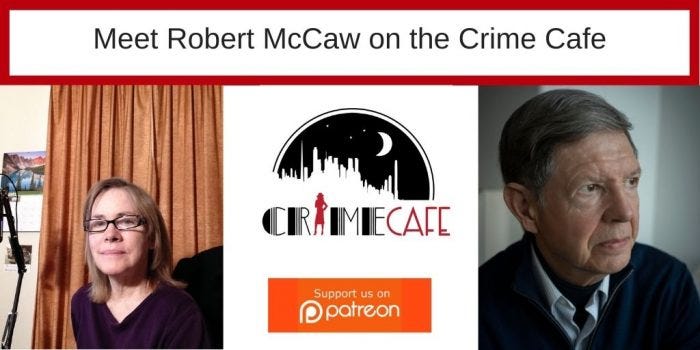


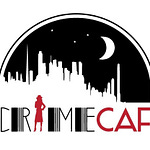
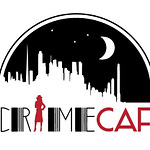
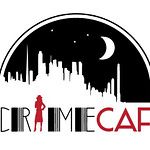
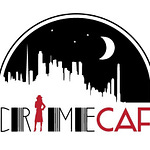

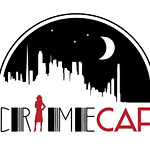


Share this post